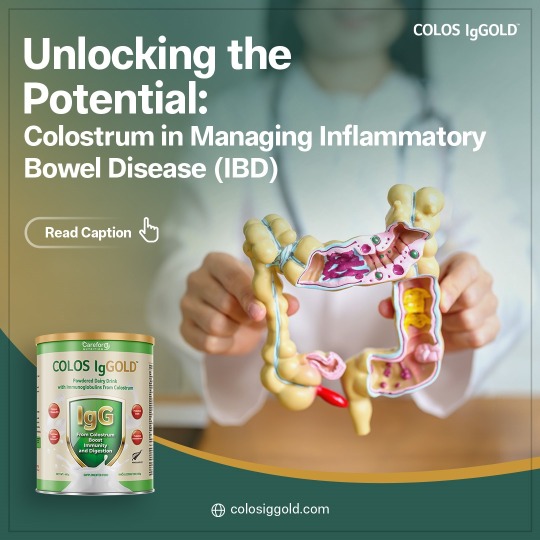#ToleranceInduction
Explore tagged Tumblr posts
Text

Colostrum, the initial milk produced by mammals after birth, shows promise in managing inflammatory bowel disease (IBD). Research suggests it has several beneficial effects in IBD:
Immunomodulatory Properties: Colostrum contains bioactive components like growth factors, immunoglobulins (especially IgA & IgG), cytokines, and lactoferrin. These help regulate the immune response in the gut, potentially reducing inflammation in IBD.
Anti-inflammatory Effects: Components like lactoferrin and immunoglobulins in colostrum exhibit anti-inflammatory properties by modulating gut inflammation pathways, contributing to IBD symptom relief.
Intestinal Barrier Protection: Colostrum contains factors supporting the intestinal barrier integrity, crucial in IBD. Growth factors like epidermal growth factor (EGF) and transforming growth factor-beta (TGF-β) help preserve this barrier, aiding in IBD management.
Antimicrobial Activity: Colostrum components like lactoferrin and antimicrobial peptides possess antimicrobial activity against pathogens, including bacteria and viruses. This may alleviate IBD flare-up symptoms by reducing microbial load and maintaining gut balance.
Nutritional Support: Rich in essential nutrients like proteins, vitamins, and minerals, colostrum supports gut health, aiding tissue repair and regeneration in inflamed intestinal mucosa, vital in IBD healing.
Tolerance Induction: Colostrum contains factors promoting immune tolerance, potentially reducing autoimmune responses seen in IBD. This may aid in preventing exacerbations and maintaining disease remission.
Overall, colostrum shows therapeutic potential in managing IBD by modulating the immune response, reducing inflammation, preserving intestinal barrier function, exerting antimicrobial activity, providing essential nutrients, and promoting immune tolerance. However, further clinical studies are needed to fully understand its mechanisms and efficacy in IBD treatment.
Check out the link of research: https://www.ncbi.nlm.nih.gov/pmc/articles/PMC8009748/
#Colostrum#IBD#InflammatoryBowelDisease#Immunomodulation#AntiInflammatory#IntestinalBarrier#Antimicrobial#NutritionalSupport#ToleranceInduction#GutHealth#TherapeuticPotential#ImmuneResponse#Research#ClinicalStudies#Health#Wellness#MedicalResearch
0 notes